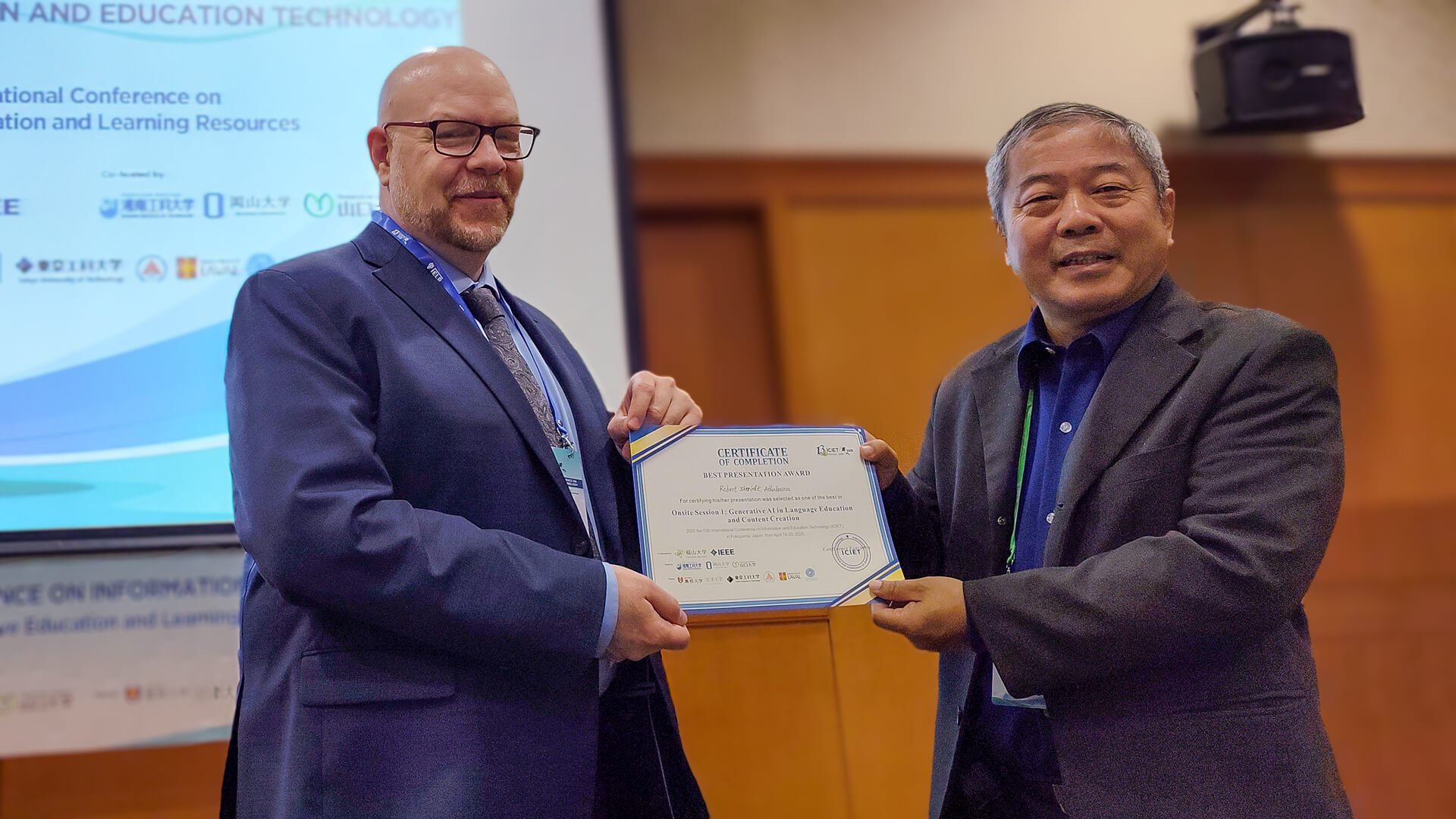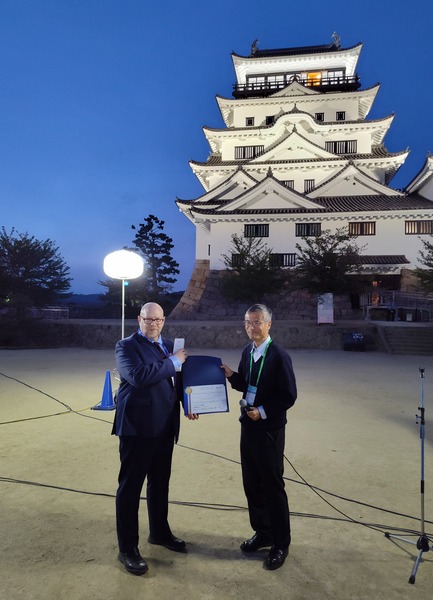Class of 2025 grad Robert Schmidt faced barriers to education his whole life. With his first degree at 53, he’s starting his post-secondary journey in earnest
For Robert Schmidt, 53, earning a Bachelor of Science in Computing and Information Systems is a high point in a decades-long, “almost storybook” journey that has been anything but predictable.
It’s a story like no other, beginning with being too anxious to even answer questions in class, dropping out of high school, and a lifelong interest in computers. It includes decades working in unsatisfying retail and restaurant jobs, many false starts with post-secondary education, a misdiagnosis of bipolar disorder, and medication that did nothing to help with his struggles. There’s a marriage, children, a divorce, another marriage, the death of a parent, the death of a stepchild, and an autism diagnosis.
The story turns a corner with his wife encouraging him to start a degree at Athabasca University, maintaining top marks, earning research internships, co-publishing with a professor he admires, presenting this work to international experts in Japan, landing a fulfilling job he’s passionate about, and living a kind of life he didn’t think was possible.
“It’s almost storybook,” Schmidt said. “I couldn’t even finish a class because of a presentation in front of other people just in and around my age, to be able to present at a prestigious conference in front of renowned researchers, including this professor I’ve idolized for so many years.”
But although he’ll walk across the Convocation stage June 5 in Athabasca, his story is nowhere near finished. He’s excited about the work he’s now doing with a clean-energy company in Calgary, Alta., and he’ll start AU’s Master of Science in Information Systems program in September.
AU grad struggled with barriers to traditional education
Schmidt knew from a young age he wasn’t typical because he could see others didn’t struggle with school the same way he did. He didn’t know why; in those days, people didn’t understand or respond to neurodiversity in the same way as they do now.
He was always uncomfortable in class—easily overwhelmed with crowds, noises, and smells. This was especially true when being called on to answer a question or to work with others on group projects.
“Growing up as a kid, being like this, it was very, very difficult to deal with other people. I had zero friends, and I struggled, struggled, struggled in school,” he said. “I went into a shell and shut everything out, including education. I just blocked it out, and in my later school years I just stopped going because I couldn’t deal with it.”
Schmidt ended up working full time, mostly in retail and restaurant jobs, but he never stopped wanting to go to university to explore his love of computers and advance his career.
He completed his high school diploma in a continuing education program with the intention of going on to earn a degree and did well in the quiet night classes. But when it came to the program’s college preparation course, he again struggled.
“That first presentation? I quit school. I couldn’t do it.”
At 30, going through a divorce, Schmidt pushed himself to return to school, opting for a combined computer science/entrepreneurship program. There, he ran into the same kinds of problems he always had.
“I would sit there outside of a class sweating and scratching myself and panicking before a class, because I knew what I had to do,” he said. “Even if it was just sitting in a group or talking to people and communicating, it was so unbelievably terrifying for me.”
While working with a counsellor at that school, he was referred to a physician who diagnosed him with bipolar disorder and prescribed medication, but it didn’t help. He still felt everything he felt before, and said the medication “also just brought me down three notches.”
Once again, he stopped going to school and focused on working full time.

Online learning offers new opportunities
Things took a turn for Schmidt, for better in some ways and for worse in others, after meeting his wife.
Having grown up with family members with autism, she immediately saw the signs not just in Schmidt but also in his son and in his father, which ultimately led to a diagnosis in his 40s.
“She started recognizing things right away,” he said. “That led to me talking to my family doctor, which got me an appointment with a specialist, and I found out I’m autistic.”
Unfortunately, the relief Schmidt felt at beginning to understand why his brain works the way it does was completely overshadowed by sadness and grief. When they met, she had a three-year old son, who was diagnosed with leukemia one year later. He passed away at age five.
Throughout this, Schmidt’s wife had planned to return to school and pursue a career in nursing. After her son’s death, and the death of her sister, she changed her mind—and besides which had found a job she was enjoying. She had something else in mind.
“She looked at me and said, ‘You’re going back to school. You’re going to take computer science because that’s what you love.’”
From research internship to prestigious international presentation
Schmidt’s wife knew about his previous experiences with education and encouraged him to look at a distance education option. He found Athabasca University, registered for a course to test the waters, and he was immediately hooked.
Despite his autism, he never registered with AU’s Accessibility Services team. This was mostly because he never wanted anyone to look at him and just see a disability, instead of seeing his personality or skill set. But it was also simply because the barriers he had experienced previously just didn’t exist at AU.
“I had never actually taken classes in my life where I didn’t have anybody breathing down my neck, I didn’t have people sitting beside me,” he said. “I didn’t have to be preparing for a weird presentation where I’m talking in front of a class of strangers. I didn’t have any of those pressures.”
 After deciding to do a full degree rather than just a few classes, Schmidt got involved with academic research through a research assistant position with Dr. Sabine Graf, working on OMEGA+, a game platform meant to support metacognitive skills—those skills that help us with learning, like associative thinking and reasoning.
After deciding to do a full degree rather than just a few classes, Schmidt got involved with academic research through a research assistant position with Dr. Sabine Graf, working on OMEGA+, a game platform meant to support metacognitive skills—those skills that help us with learning, like associative thinking and reasoning.
While there were meetings and group work involved, Schmidt said dealing with social interactions through the computer screen was much easier than in person. It wasn’t easy at first, but he got used to the group and found he was able to make presentations and take part in the discussions.
He continued with this research group even after the formal research assistant position was finished. When more roles came up, he kept applying, ultimately doing a lot of work with Dr. Maiga Chang on his authorship forensics work—exploring how to use AI to determine whether a specific piece of text was written by a human or an AI.
Schmidt had several research internships and also received the Undergraduate Student Research Award through the National Science and Engineering Research Council. His work with Chang culminated in a published academic paper, which the two presented at a conference in Japan.
I don’t think I would have been able to accomplish what I’ve accomplished without those internships, and doing research at the university.
Degree leads to new career, graduate studies
While presenting at an international research conference is a highlight in and of itself, the research Schmidt worked on has direct connections to the kind of professional work he’s doing now. His experience helped him get hired to his current role as a software developer with Calgary-based Firefly Solar, a company he’s passionate about.
“I don’t think I would have been able to accomplish what I’ve accomplished without those internships, and doing research at the university,” he said.
Schmidt’s story keeps getting better with each new development, and he sees more of that on the horizon. In September 2025 he’ll begin AU’s Master of Science in Information Systems program, thanks to the flexibility that will allow him to balance his study schedule with his full-time job.
And he’s already planning to continue working with Chang, both through the research group and as supervisor of his master’s thesis.
He encourages other AU students to take advantage of the different research opportunities and make their own contributions to the vibrant research culture to add to the university’s growing reputation.
“The more research we do, and the more productive research we do, will add to that prestige,” he said.